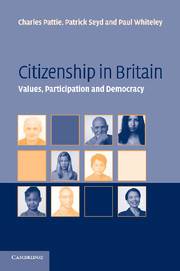Book contents
- Frontmatter
- Contents
- List of Figures
- List of Tables
- Acknowledgements
- Preface
- 1 What is Citizenship?
- I Understanding Citizenship
- 2 Civic Beliefs and Citizenship
- 3 Civic Behaviour and Citizenship: Macro Politics
- 4 Civic Behaviour and Citizenship: Micro Politics
- II Modelling Citizenship
- III The Consequences of Citizenship
- Appendices
- Bibliography
- Index
2 - Civic Beliefs and Citizenship
Published online by Cambridge University Press: 22 September 2009
- Frontmatter
- Contents
- List of Figures
- List of Tables
- Acknowledgements
- Preface
- 1 What is Citizenship?
- I Understanding Citizenship
- 2 Civic Beliefs and Citizenship
- 3 Civic Behaviour and Citizenship: Macro Politics
- 4 Civic Behaviour and Citizenship: Micro Politics
- II Modelling Citizenship
- III The Consequences of Citizenship
- Appendices
- Bibliography
- Index
Summary
In part I of this book we answer the question ‘What is citizenship?’ in contemporary Britain by exploring, firstly, people's beliefs about their civic duties and rights and, secondly, their patterns of civic behaviour. In this chapter we look specifically at their beliefs and attitudes, but we do so in very broad terms. This means examining some of the attitudes and beliefs associated with the idea of citizenship in rather general terms. However, for modelling purposes, when we begin to ask the question ‘What determines the attitudes which underpin effective citizenship?’ we have to refine the analysis and concentrate on certain key issues. These are attitudes to rights and obligations which the discussion in chapter 1 suggested are at the heart of modern citizenship. However, before embarking upon any analysis of attitudes, we need to elaborate on some of the key features of the Citizen Audit from which our findings are drawn.
The Citizen Audit
The Citizen Audit was funded by the Economic and Social Research Council as part of its Democracy and Participation research programme. It was a series of surveys designed to examine citizenship in Britain today. In addition to measuring people's civic attitudes and behaviour, the Citizen Audit was constructed in such a way as to investigate some of the key political concepts which are relevant to citizenship including political knowledge, interest, efficacy, tolerance and participation.
- Type
- Chapter
- Information
- Citizenship in BritainValues, Participation and Democracy, pp. 29 - 75Publisher: Cambridge University PressPrint publication year: 2004



